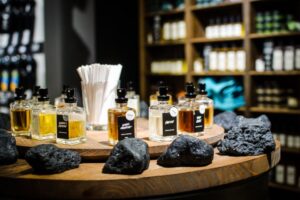The Bakkafrost Group delivered a total operating EBIT of DKK 253.6 million in Q1 2016. Harvested volumes were 10,934 tonnes gutted weight. The combined farming and VAP segments made an operational EBIT of DKK 236.0 million. The farming segment made an operational EBIT of DKK 260.8 million, and the increased salmon spot prices had a positive effect on the farming segment. The high salmon spot prices affected the VAP segment negatively, and the VAP segment made an operational EBIT of DKK -24.8 million. The EBITDA for the FOF segment was DKK 69.0 million.
The total volumes harvested in Q1 2016 were 10.9 thousand tonnes gutted weight. The farming segment delivered an operational EBIT of DKK 261 million in Q1 2016, which corresponds to NOK 30.45 per kg. The VAP segment made an operational EBIT of DKK -25 million. The FOF segment delivered an EBITDA of DKK 69 million in Q1 2016.
Commenting on the result, CEO Regin Jacobsen said:
“ The expected decrease in supply of farmed salmon in 2016 and the stable increasing demand has resulted in high price increase for the past months. The first quarter was overall satisfying for Bakkafrost, but when the salmon price increases sharply during a short period, the circumstances for the VAP segment become difficult. The next six months will be an exciting time for Bakkafrost, as two of the major investments – the hatchery at Viðareiði and the combined harvest/VAP factory at Glyvrar – will be completed. These investments play an important role in strengthening the competiveness of the company and will improve Bakkafrost’s contingency plan, as well as the salmon farming in the Faroe Islands in general, significantly. ”
Bakkafrost released 1.9 million smolts in Q1 2016, compared to 2.2 million smolts in Q1 2015.
Havsbrún’s sourcing of raw material continued to be good in Q1 2016 from last year. Havsbrún purchased 71,568 tonnes of raw material in Q1 2016.
The Annual General Meeting convened on 8 April 2016 decided to pay out a dividend of DKK 8.25 per share, corresponding to NOK 10.37 per share. The total dividend of DKK 403.1 million (NOK 506.6 million) was paid out on 25 April 2016.
Bakkafrost’s net interest bearing debt was DKK 218 million at the end of Q1 2016, compared with DKK 392 million at year-end 2015. Bakkafrost had undrawn credit facilities of approximately DKK 1,074 million at the end of Q1 2016, and the equity ratio was 66%.
OUTLOOK
Market
The global demand in the salmon market continues with strong growth rates. The market balance will be tighter in 2016, compared to 2015. Global supply of Atlantic salmon is expected to decrease by 6% in volume during 2016, compared to 2015. Production capacity is close to full utilization and further expansion relates to high investments.
Farming
The outlook for the farming segment is good. Biology and veterinary situation is the most important risk area for Bakkafrost. The Group is focusing on this risk with new investments and procedures to diminish the risk. Sea lice is an area, which has demanded more effort and is a part of the biological risk. Bakkafrost’s new live fish carrier, M/S Hans á Bakka, has freshwater treatment equipment installed. M/S Hans á Bakka’s operations using freshwater has shown to be effective against sea lice and these operations will therefore be an important part of Bakkafrost’s treatment against sea lice. The biological situation is good, and the price outlook in the market place is good.
Bakkafrost expects to harvest 48,000 tonnes gutted weight in 2016. Bakkafrost’s forecast for smolt release in 2016 is 10.4 million pieces. The estimates for harvesting volumes and smolt releases is as always dependent on the biological situation.
Value added products (VAP)
Bakkafrost’s long-term strategy is to sell around 40-50% of the harvested volumes of salmon as value added products on fixed price contracts. The contracts last for 6 to 12 months. Bakkafrost has signed contracts covering around 63% of the VAP capacity for the rest of 2016. This corresponds to around 25% of the expected harvested volumes for the rest of 2016.
Fishmeal, -oil and feed (FOF)
The outlook for the production of fishmeal and fish oil is dependent on the availability of raw material. The quotas for catching blue whiting in the North Atlantic are expected to be reduced, and therefore the production of fishmeal and fish oil are most likely to reduce in volume in 2016 from relatively high volumes in 2015.
The major market for Havsbrún´s fish feed is the local Faroese market including Bakkafrost’s internal use of fish feed.
Havsbrún’s sales of fish feed in 2016 is expected to be at 80,000 tonnes.
Investments
The total investments for the period 2014-2017 were announced to be DKK 1,370 million including maintenance CAPEX, whereof the future investment plan for the next two years is DKK 570 million according to the announced investment plan from August 2014.
In March 2016, Bakkafrost announced the decision to enhance already ongoing hatchery investments by investing in a new hatchery amounting to approximately DKK 650 million. This investment will take place over the period from 2016-2018. Approximately DKK 150 million were included in the investment plan from August 2014.
Altogether the updated investments for the period from 2016-2018 will amount to DKK 570 million, plus the additional DKK 500 million from the enhanced hatchery investment, giving a total of DKK 1,070 million.
The investment of the new harvest/-VAP factory will be finalised in 2016. The harvest operation is expected to start in Q2 2016, while the VAP operation will start in H2 2016. There will be some extra costs during the start-up period, but the investment is expected to result in operational savings of DKK 70-90 million per year with gradual effect from 2017.
With the new enhanced hatchery investment from March 2016, Bakkafrost plans to increase the smolt capacity even further. In the investment plan from August 2014, Bakkafrost had the goal to be self-supplied with smolts at a size of 200-300g each before the end of 2017, but the new long-term goal is to be self-supplied with smolts at a size of 400-500g each in 2019. The benefits are shorter production time at sea as well as reduced biological risk.
The expansion of the hatchery at Viðareiði, which started in 2015, will be finalised in Q3 2016 – the production will start up in Q2 2016, however. The expansion will fourfold the capacity of this hatchery. The construction of the new hatchery Á Strond will start in Q2 2016 and is planned to be finished in 2018.
Financial
Improved market balances in the world market for salmon products and costs effective production will likely improve the financial flexibility going forward. A high equity ratio with the Group’s bank financing and the issuance of bonds makes Bakkafrost’s financial situation strong. This enables Bakkafrost to carry out its investment plans to further focus on strengthening the Group, M&A’s, organic growth opportunities and fulfil its dividend policy in the future.
Please find enclosed the Company’s Q1 2016 report and presentation.
About Bakkafrost:
Bakkafrost is the largest salmon farmer in the Faroe Islands. The Group is fully integrated from feed production to smolt, farming, VAP and sales. The Group has production of fishmeal, fish oil and salmon feed in Fuglafjørður. The Group operates licenses on 14 farming fjords. The Group has primary processing in Klaksvík, Strendur, Kollafjørður, and secondary processing (VAP) in Glyvrar and Fuglafjørður. The headquarter is located in Glyvrar, and the company has 725 fulltime employees.





